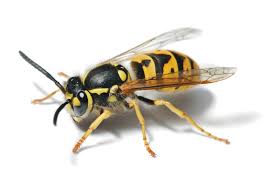中文词源
wasp 黄蜂
来自PIE*wopsa,编织,构造,来自PIE*webh,编织,纺织,词源同web,weave.字母p,s置换。用于指黄蜂。
英语词源
- wasp
-
wasp: [OE] Etymologically, the wasp may be the ‘weaver’. The word comes ultimately from Indo- European *wobhes- or *wops-, which was probably derived from the base *webh-, *wobh- ‘weave’ (source of English weave, web, etc); the allusion is presumably to the papery nest which many species construct. West Germanic took this over as *wabis- or *waps-, and the process of metathesis (reversal of sounds) produced English wasp and German wespe. From the same Indo-European ancestor come Latin vespa (source of French guêpe, Italian vespa, and Spanish avispa) and Russian osa.
=> weave, web - wasp (n.)
- Old English wæps, wæsp "wasp," altered (probably by influence of Latin vespa) from Proto-Germanic *wabis- (cognates: Old Saxon waspa, Middle Dutch wespe, Dutch wesp, Old High German wafsa, German Wespe, Danish hveps), from PIE *wopsa-/*wospa- "wasp" (cognates: Latin vespa, Lithuanian vapsa, Old Church Slavonic vosa "wasp," Old Irish foich "drone"), perhaps from *webh- "weave" (see weave (v.)). If that is the correct derivation, the insect would be so called for the shape of its nest. Of persons with wasp-like tendencies, from c. 1500. Wasp-waist in reference to women's figures is recorded from 1870 (wasp-waisted is from 1775).
- WASP (n.)
- acronym for White Anglo-Saxon Protestant, by 1955.
权威例句
- 1. The dress exaggerates her wasp waist and enlarges her bosom.
- 那件连衣裙凸显了她的蜂腰,也让她的胸部看起来更丰满。
- 2. A wasp flew in the open window.
- 一只黄蜂飞进了开着的窗子。
- 3. I was stung on the arm by a wasp.
- 我的胳膊给黄蜂蜇了一下。
- 4. a privileged Wasp background
- 享有特权的盎格鲁&dash1;撒克逊裔白人新教徒出身
- 5. The dog went berserk when a wasp stung him.
- 狗给黃蜂咬了,变得狂暴.

